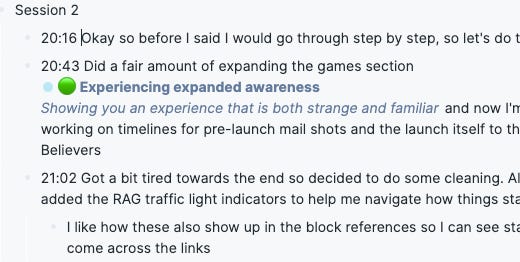Thinking Out Loud No. 28
Performative Meaning, building out loud and Setenil de las Bodegas
Hi everyone,
It’s a sunny Saturday morning here in London. I’ve been on a bit of a health kick recently — nutrient dense food, lots of exercise, consistent sleep schedule — and I’m feeling better than ever. Let me know if you’re struggling with any of these and I’d be happy to chat about my experience.
For this issue of Thinking Out Loud I have written a piece on ‘Performative Meaning’ — the act of looking like you derive meaning from something — here in the context of work. This is starting to access some much deeper things that are important to me, particularly the nature of subtle or implicit coercion and how to systematically undo it.
There are also some updates on my Alexander Technique course in development, with a focus on my ‘building out loud’ approach.
I hope you enjoy!
Performative Meaning and the suppression of desire
Back in No. 24 I wrote about the idea of Total Work, a state of being where work is the central and defining focus of life. As a quick recap, philosopher Andrew Taggart summarises five conditions of Total Work:
When work is the centre around which all of human life turns
When everything else in human life is not only put in the service of, but is made to be subservient to, work
When leisure, play and festivity slowly – perhaps imperceptibly – are turned into work
When we come to believe that we were born to work
When all other ways of living – those that existed well before work took over the world – fall away from cultural memory
Total Work is an idea that, once in your awareness, is impossible to get out. You start to see it everywhere. I'd like to talk briefly about one manifestation of it in what I'm calling Performative Meaning.
As new generations have entered the workforce over recent decades, it seems as though there's been an increasing shift towards the need for work to be meaningful. The jobs we do must have 'impact', serve some higher purpose or be otherwise 'important'.
A YouGov poll of UK workers earlier this year showed that "a quarter of British workers don't find their job meaningful":

Meanwhile, in an article from 2018, HBR reports that 9 Out of 10 People Are Willing to Earn Less Money to Do More-Meaningful Work. The article closes by highlighting the value of meaningful work to organisations:
“Meaningful work only has upsides. Employees work harder and quit less, and they gravitate to supportive work cultures that help them grow. The value of meaning to both individual employees, and to organizations, stands waiting, ready to be captured by organizations prepared to act.”
Now, anyone who knows me knows that I am also a fan of finding meaning in our lives, so I don't disagree with the idea that we should be encouraging people to do jobs that give them a sense of meaning — should that be what they want.
But I want to highlight what I'm seeing as a potential perverse cultural incentive that can pressure individuals to suppress their own innate 'inner guidance systems'.
The vast majority of workers occupy positions within hierarchical organisations and many want to progress up their respective hierarchies for various personal reasons: earning more, growing as professional, status, or even that pursuit of meaning and impact. Moving up these hierarchies means playing the games required to do so — getting good performance reviews, impressing the right people and so on.
This is where meaning can take on a darker tone.
I suspect that appearing to find your job meaningful is increasingly one of the conditions required to progress up the hierarchy. Finding meaning in your work has become a virtue, which opens up the possibility of virtue signalling, with workers jostling to demonstrate how much meaning they get from their job — whether or not they actually do. This is what I mean by Performative Meaning.
From my perspective, it's unreasonable to expect that:
all work can be inherently meaningful
all people are already in their own optimally meaningful jobs (should that be what they want)
all people even want meaning from their work
Therefore I suspect there are many workers currently engaged, knowingly or not, in Performative Meaning. But why is this a problem?
If you don’t find meaning in your work — but feel like you should — then acting like you do can be very difficult, particularly over the sufficiently long timescales required to progress up a hierarchy. An easier route is to convince yourself somehow that you really do find meaning in your work, which may be an act of suppressing your innate wants and motivations.
This touches on a wider point that is much too deep to go into here, but I believe that invalidating our innate wants and 'dis-wants' is damaging. If a child says "I want an ice cream", the last thing you would (or indeed should) say is "no you don't". Because, yes — yes they very much do want the ice cream. That doesn't necessarily mean they should have it, but their perception of their own desires is not something that should be messed with.
Scaled up, such suppression can lead to the habitual situation where a very quiet inner voice says "I don't want this job/relationship/place" and a much louder inner voice snaps back immediately “oh yes you do". Over time the quiet voice recedes into more subtle, perhaps somatic experiences of stress, anxiety and other likely body-related manifestations of 'wrong', while the loud head voice can’t figure out why ‘there is unhappiness’.
I'll wrap up here by asserting my belief that better outcomes are available at both individual and societal scales when we know what we really want and have the skills to choose our response to those wants, without inner interference.
We have a task ahead of us to undo the suppression of our own desires, unlock our true capacities and express ourselves fully. But that can't happen if we create and enforce structures that don't allow us to be honest even with ourselves, let alone with each other.
I still believe the idea of finding meaning at work is a net good that allows for conversations and behaviours that weren't possible before, but at the same time we should remain vigilant for second-order effects like Performative Meaning.
We can even use awareness of this effect an opportunity to continually undo the associated layers of suppression and ask ourselves, honestly: what do I want, really? — and then shut up and listen for the inner voice to speak once again.
Building Out Loud: Alexander Technique online course update
I’ve got myself into a pretty good routine lately with course development (and you can learn more about the course over on Expanding Awareness.)
Since I’m still not commuting to an office — and don’t expect to be until some time in 2021, let’s be honest here — I have been making good use of my mornings for course creation and consistently spend an hour at 07:30 doing focussed work.
Focusmate
I owe this in large part to a service called Focusmate, which pairs you with a stranger who also wants to focus on something for an hour or so.
At the beginning of the session you start an audio and video chat, greet each other, state your goals, and then leave the video on (with the microphone off) while you both work.
Right now I can see Sandra working away on her flashcards on my second monitor while I write this. At the end of the session, in 16 minutes, we’ll both unmute, share how we did against our goals, and say goodbye.
This system is amazing.
By putting in a ‘meeting’ for 07:30 each morning, I actually get up and orient myself around it. It’s like I’m giving a strong signal to the part of myself that wakes up that this is how things are going to be, and there’s no temptation to skip it. Nor is there any temptation to ‘check’ Twitter while I’m working, because there’s another human ‘here’ with me.
Thanks to Zach Philips for putting me onto this idea (and go subscribe to his fantastic Personal Email Newsletter).
Sharing the ‘behind the scenes’
Another thing I’m finding really helpful is to commit to sharing something from each work session on Twitter in an ongoing ‘building out loud’ thread. This not only helps keep me focused, but also seems to switch on the meta processes in my mind that keep an eye out for things that are worth sharing.
For example, I’m really enjoying the use of both colourful ‘BRAG’ status indicators (B = blue = completed) for each section as well as keeping an ongoing log of what I’m working on and how I feel. Sharing these publicly feels like a great way to show people how the sausage is made and also my own thought processes.
And, of course, it’s also a good way to keep talking about the fact that I’m making a course without actually promoting the course 🤭.
Place of the week
I came across Setenil de las Bodegas on Twitter recently. It’s a Spanish town by a gorge, with many of the houses actually built into the gorge in some way.


And here’s a fun fact from Wikipedia: it’s also the direct antipode of Auckland, in New Zealand.
By the way, I came across Setenil de las Bodegas via @Thinkwert on Twitter who, if you’re active on Twitter, is well worth a follow.
Until next time!
If you enjoyed this newsletter and think someone else might too then please feel encouraged to forward it on. And if you were sent this email by someone else, then welcome! You can subscribe here or check out my latest blog posts.








Love the concept of performative meaning.